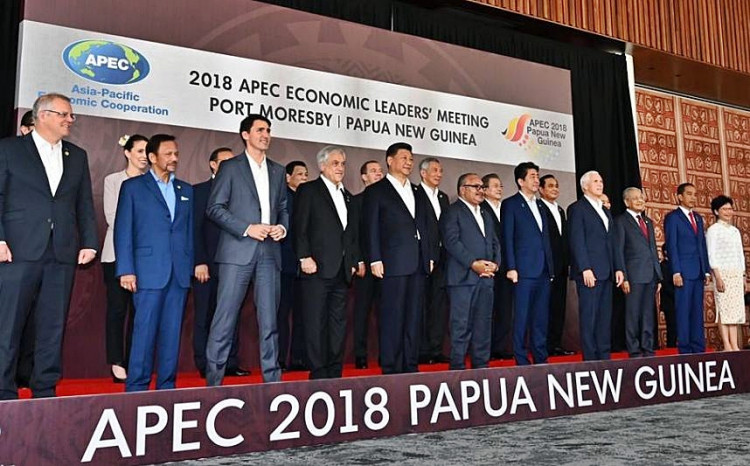The 21 member economies of the Asia-Pacific Economic Cooperation (APEC) for the first time in its history failed to agree on a Leaders' Declaration due to a very public and inimical feud between China and the United States.
World leaders meeting in Papua New Guinea from Nov. 17 to 18 for the APEC trade talks were instead transformed into bystanders at a divisive summit. U.S. Vice-President Mike Pence took every opportunity to blast China for being an enemy of democracy and free trade and a predatory lender.
President Donald Trump did not attend APEC due to a brooding indifference and a rage at everyone and everything caused by the Republican Party's loss of control over the House of Representatives in the midterm elections of Nov. 6.
Papua New Guinea Prime Minister Peter O'Neill, who chaired the event, said the talks broke down over language about the World Trade Organization (WTO). The Trump administration resolutely opposes the way WTO treats China as a market-driven economy rather than one that is a dictatorship and dominated by state-supported industries.
He assailed China's multi-billion dollar Belt and Road Initiative as a massive debt trap aimed at forcing debt onto the poor countries it coerces into joining the project aimed at boosting China's geopolitical power.
Pence said the U.S. doesn't drown its partners in a sea of debt, and doesn't coerce or compromise its partners' independence. He said the United States deals openly and fairly. The U.S. doesn't offer a constricting belt or a one-way road.
China's response to Pence's tongue-lashing was muted by comparison. China's Ministry of Foreign Affairs issued a terse statement saying the "assistance provided by China has been warmly welcomed by our partners in this region and beyond."
Chinese sources said tensions erupted when Chinese Foreign Minister Wang Yi objected to two paragraphs in the draft Leaders' Declaration. One paragraph said APEC should oppose "unfair trade practices" and reform the WTO, while another was about sustainable development.
They said China was angered that the reference to WTO blamed a country (China) for unfair trade practices.
Chinese president Xi Jinping did not directly reply to Pence's criticisms but instead urged business and political leaders to promote free trade.
The world today is going through major development, transformation and change, said Xi. While economic globalization surges forward, global growth is shadowed by protectionism and unilateralism.
O'Neill said he will release a chairman's statement this week on behalf of the 21 APEC member economies. He acknowledged that "the entire world is worried" about tensions between the two superpowers.
A Leaders' Declaration has been issued after every annual APEC leaders' meeting since the first APEC summit in 1993.






